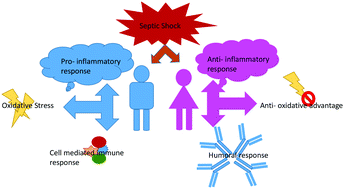Gender-specific association of oxidative stress and immune response in septic shock mortality using NMR-based metabolomics†
Abstract
Background: Sepsis and septic shock are still associated with a high mortality rate. The early-stage prediction of septic shock outcomes would be helpful to clinicians for designing their treatment protocol. In addition, it would aid clinicians in patient management by understanding gender disparity in terms of clinical outcomes of septic shock by identifying whether there are sex-based differences in sepsis-associated mortality. Objective: This study aimed to test the hypothesis that gender-based metabolic heterogeneity is associated with sepsis survival and identify the biomarkers of mortality for septic shock in an Indian cohort. Method: The study was performed in an Indian population cohort diagnosed with sepsis/septic shock within 24 hours of admission. The study group was 50 patients admitted to intensive care, comprising 23 females and 27 males. Univariate and multivariate analysis were performed to identify the biomarkers for septic shock mortality and the gender-specific metabolic fingerprint in septic shock-associated mortality. Results: The energy-related metabolites, ketone bodies, choline, and NAG were found to be primarily responsible for differentiating survivors and non-survivors. The gender-based mortality stratification identified a female-specific association of the anti-inflammatory response, innate immune response, and β oxidation, and a male-specific association of the pro-inflammatory response to septic shock. Conclusion: The identified mortality biomarkers may help clinicians estimate the severity of a case, as well as predict the outcome and treatment efficacy. The study underlines that gender is one of the most significant biological factors influencing septic shock metabolomic profiles. This understanding can be utilized to identify novel gender-specific biomarkers and innovative targets relevant for gender medicine.



 Please wait while we load your content...
Please wait while we load your content...